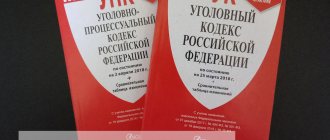Criminal Code of the Russian Federation in the latest edition:
Article 118 of the Criminal Code of the Russian Federation. Causing grievous bodily harm through negligence
1. Causing grievous bodily harm through negligence -
shall be punishable by a fine in the amount of up to eighty thousand rubles, or in the amount of the wages or other income of the convicted person for a period of up to six months, or by compulsory labor for a term of up to four hundred eighty hours, or by corrective labor for a term of up to two years, or by restriction of liberty for a term of up to three years. , or arrest for up to six months.
2. The same act, committed as a result of improper performance by a person of his professional duties, -
is punishable by restriction of freedom for a term of up to four years, or forced labor for a term of up to one year with deprivation of the right to occupy certain positions or engage in certain activities for a term of up to three years or without it, or imprisonment for a term of up to one year with deprivation of the right to occupy certain positions or engage in certain activities for a period of up to three years or without it.
3. Lost power. — Federal Law of December 8, 2003 N 162-FZ.
4. Lost power. — Federal Law of December 8, 2003 N 162-FZ.
Return to the table of contents of the document: Criminal Code of the Russian Federation in the latest edition
Comments on Article 118 of the Criminal Code of the Russian Federation
An assault is directed against human health and is formulated as a material crime, when the action or inaction of the perpetrator causes serious harm to the health of the victim.
The object of the crime provided for in Art. 118 of the Criminal Code of the Russian Federation is human health.
The objective side of the crime is expressed in the act in the form of action or inaction, consisting of a violation of the rules of household or professional precautions, consequences in the form of serious harm to the health of the victim and the causal connection between them.
For the concept and signs of serious harm to health, see the commentary to Art. 111 of the Criminal Code of the Russian Federation.
The subjective side is characterized by a careless form of guilt in the form of frivolity or negligence. The perpetrator, when committing an act, foresees the possibility of causing serious harm to health, but arrogantly hopes to prevent it (if he is frivolous), or does not foresee the possibility of causing such harm, although with due care and forethought he should and could have foreseen it.
Causing moderate or minor harm to health through negligence does not entail criminal liability.
The subject of the crime provided for in Part 1 of Art. 118 of the Criminal Code of the Russian Federation, general - a sane individual who has reached the age of sixteen.
The subject of the crime provided for in Part 2 of Art. 118 of the Criminal Code of the Russian Federation, special . In addition to the general requirements for the subject, it is also required that the person, during the commission of a crime, fulfill his professional duties, between the improper performance of which there is a cause-and-effect relationship.
Due to the careless nature of the crime as part of the crime provided for in Art. 118 of the Criminal Code of the Russian Federation, complicity in it is impossible.
The law recognizes the infliction of grievous bodily harm due to improper performance by the subject of his professional duties as a qualifying
Improper performance by a person of his professional duties (Part 2 of Article 118 of the Criminal Code of the Russian Federation) refers to negligent, negligent, irresponsible or dishonest actions of a person who is obliged to properly perform his official functions and has a real opportunity to properly perform these functions.
What are the responsibilities?
Responsibility, or the disposition of the norm, can be found directly in the text of Article 118 of the Criminal Code of the Russian Federation . A judge, when passing a sentence in a criminal case, may choose one of the following types of punishment for the cause of harm (Part 1).
- Monetary punishment:
- a fine of up to 80 thousand rubles;
deprivation of wages or other income of the sentenced person for a period of up to six months.
- Execution of work:
- mandatory – up to 480 hours;
- correctional – up to 2 years.
- Deprivation of liberty:
- restriction of freedom for a period of no more than 3 years;
- arrest for up to six months.
- In addition, in part two, for a special subject of a crime - a citizen performing his professional duties, More severe penalties have been established for a similar crime:
- restriction of freedom for 4 years or less;
- forced labor for a period of up to 1 year, while a citizen may additionally lose the right to occupy certain positions or conduct certain activities for a period of up to 3 years;
- imprisonment for 1 year also with or without the additional punishment specified above.
Careless infliction of grievous bodily harm as an element of the objective side of another crime
Careless infliction of grievous bodily harm may be an element of the objective side of other crimes. In some compositions, causing grievous harm to health through negligence is a constituent consequence mentioned in the main composition , for example:
- Art. 143 of the Criminal Code of the Russian Federation - violation of labor protection requirements committed by a person who is entrusted with the obligation to comply with them, if this resulted in the infliction of serious harm to human health through negligence;
- Art. 215.1 of the Criminal Code of the Russian Federation - illegal termination or restriction of the supply of electrical energy to consumers or disconnection of them from other sources of life support, committed by an official, as well as a person performing managerial functions in a commercial or other organization, if this resulted through negligence in causing major damage, serious harm to health or other serious consequences;
- Art. 216 of the Criminal Code of the Russian Federation - violation of safety rules when carrying out construction or other work, if this entailed, through negligence, the infliction of serious harm to human health or major damage;
- Art. 217.1 of the Criminal Code of the Russian Federation - violation of the requirements for ensuring the safety and anti-terrorism protection of fuel and energy complex facilities, if this act negligently resulted in the infliction of serious harm to human health or the infliction of major damage;
- Art. 218 of the Criminal Code of the Russian Federation - violation of the rules for accounting, storage, transportation and use of explosives, flammable substances and pyrotechnic products, as well as the illegal transfer of these substances by mail or luggage, if these acts negligently resulted in the infliction of serious harm to health or the death of a person;
- Art. 219 of the Criminal Code of the Russian Federation - violation of fire safety requirements, committed by a person who was responsible for their compliance, if this resulted in negligence causing serious harm to human health;
- Art. 264 of the Criminal Code of the Russian Federation - violation by a person driving a car, tram or other mechanical vehicle of the rules of the road or the operation of vehicles, resulting in negligence in causing serious harm to human health;
- Art. 266 of the Criminal Code of the Russian Federation - poor-quality repairs of vehicles, means of communication, signaling or communication means or other transport equipment, as well as the release into operation of technically faulty vehicles by a person responsible for the technical condition of vehicles, if these acts negligently resulted in the infliction of serious harm to human health ;
- etc.
In other elements of the crime, causing grievous bodily harm through negligence is a qualifying or especially qualifying feature , for example:
- Art. 127.1 of the Criminal Code of the Russian Federation - purchase and sale of a person, other transactions in relation to a person, as well as recruitment, transportation, transfer, concealment or receipt committed for the purpose of his exploitation, resulting through negligence in death, causing grave harm to the health of the victim or other grave consequences;
- Art. 127.2 of the Criminal Code of the Russian Federation - the use of the labor of a person in respect of whom the powers inherent in the right of ownership are exercised, in the event that the person, for reasons beyond his control, cannot refuse to perform work (services), which through negligence resulted in death, causing serious harm to the health of the victim or other serious consequences;
- Art. 131 of the Criminal Code of the Russian Federation - rape, resulting through negligence in causing grievous harm to the health of the victim;
- Art. 132 of the Criminal Code of the Russian Federation - sodomy, lesbianism or other actions of a sexual nature using violence or the threat of its use to the victim (victim) or to other persons, or taking advantage of the helpless state of the victim (victim), resulting through negligence in causing grievous harm to the health of the victim (victim) ;
- Art. 215 of the Criminal Code of the Russian Federation - violation of safety rules during the placement, design, construction and operation of nuclear energy facilities, resulting in negligence in causing serious harm to health or death of a person;
- Art. 217.2 of the Criminal Code of the Russian Federation - issuing by an expert in the field of industrial safety a knowingly false conclusion of an industrial safety examination, if this act negligently resulted in the infliction of serious harm to health or the death of a person;
- Art. 234.1 of the Criminal Code of the Russian Federation - illegal production, manufacturing, processing, storage, transportation, shipment, acquisition, import into the territory of the Russian Federation, export from the territory of the Russian Federation for the purpose of sale, as well as illegal sale of new potentially dangerous psychoactive substances, the circulation of which is prohibited in the Russian Federation if these acts negligently resulted in the infliction of serious harm to human health;
- etc.
Distinguishing the infliction of grievous bodily harm by negligence from other types of harm
Infliction of grievous bodily harm by negligence should be distinguished from intentional infliction of bodily harm . The distinction is made based on the factual circumstances of the case and the signs of guilt. The crime provided for in Article 118 of the Criminal Code of the Russian Federation is characterized by the absence of both direct and indirect intent to intentionally cause grievous harm to the health of the victim. As a rule, the act is qualified under Art. 118 of the Criminal Code of the Russian Federation in the case when the consequences occur not as a result of direct impact on the victim, but due to the further development of a cause-and-effect relationship. For example, receiving serious injuries when falling from a push with your hands.
On the other hand, causing serious harm to health through negligence must be distinguished from innocent causing harm to health , i.e. case (incident). Innocent infliction of grievous bodily harm occurs if the person did not foresee the possibility of such harm and, due to the circumstances of the case, should not or could not have foreseen it, and also if the person, although he foresaw the possibility of its occurrence, could not prevent it due to the inadequacy of his psychophysiological qualities to the requirements of extreme conditions or neuropsychic overload (Article 28 of the Criminal Code of the Russian Federation).
Careless infliction of grievous bodily harm, resulting through negligence in the death of the victim, is qualified as causing death by negligence (Article 109 of the Criminal Code of the Russian Federation). If there is no careless guilt in relation to death, the act is qualified under Part 1 or 2 of Art. 118 of the Criminal Code of the Russian Federation, despite the fatal outcome.
Expertise
In cases provided for in Art. 111 of the Criminal Code of the Russian Federation and Article 118 of the Criminal Code of the Russian Federation (Article 109 of the Criminal Code of the Russian Federation, Article 105 of the Criminal Code of the Russian Federation, etc.) it is mandatory to conduct a forensic medical examination, since only a forensic expert or a commission of experts can determine the nature of the victim’s bodily injuries, the mechanism and duration of their formation, the causal relationship between the actions of the suspect/accused and the victim’s bodily injuries, the location of the injuries and the degree of severity, whether the injuries were received posthumously or intravitally. In this case, the expert is often provided not only with the victim and his medical record, but sometimes with a video recording and materials of the criminal case in whole or in part, including the testimony of the suspect/accused. In this regard, it may be important and necessary to file a petition and conduct additional interrogation of the suspect/accused before scheduling the examination.
When determining the degree of severity, experts are currently guided, among other things, by the Decree of the Government of the Russian Federation dated August 17, 2007 N 522 (as amended on November 17, 2011) “On approval of the Rules for determining the degree of severity of harm caused to human health” and the Order of the Ministry of Health and Social Development of the Russian Federation dated April 24, 2008 N 194n (as amended on January 18, 2012) “On approval of Medical criteria for determining the severity of harm caused to human health” (registered with the Ministry of Justice of the Russian Federation on August 13, 2008 N 12118).
Various types of forensic medical examinations of material evidence can be assigned to conduct molecular genetic or medical forensic, forensic biochemical, cytological and other types of research. Sometimes, in order to establish the truth in a case, forensic biological, forensic chemical and other necessary examinations are prescribed.
An examination is ordered by an investigator or a court, including when a lawyer submits a substantiated request for the need to conduct a particular study. It is necessary to carefully read the decisions on the appointment of examinations, since they indicate the questions that the expert will need to answer. A timely, well-founded request to raise a particular issue with an expert can contribute to the timely clarification of the essential circumstances of the case.
To clarify this conclusion, the expert may be questioned at the request of the defense. The Code of Criminal Procedure of the Russian Federation provides for the possibility of requesting a repeat or additional forensic examination of the case.



